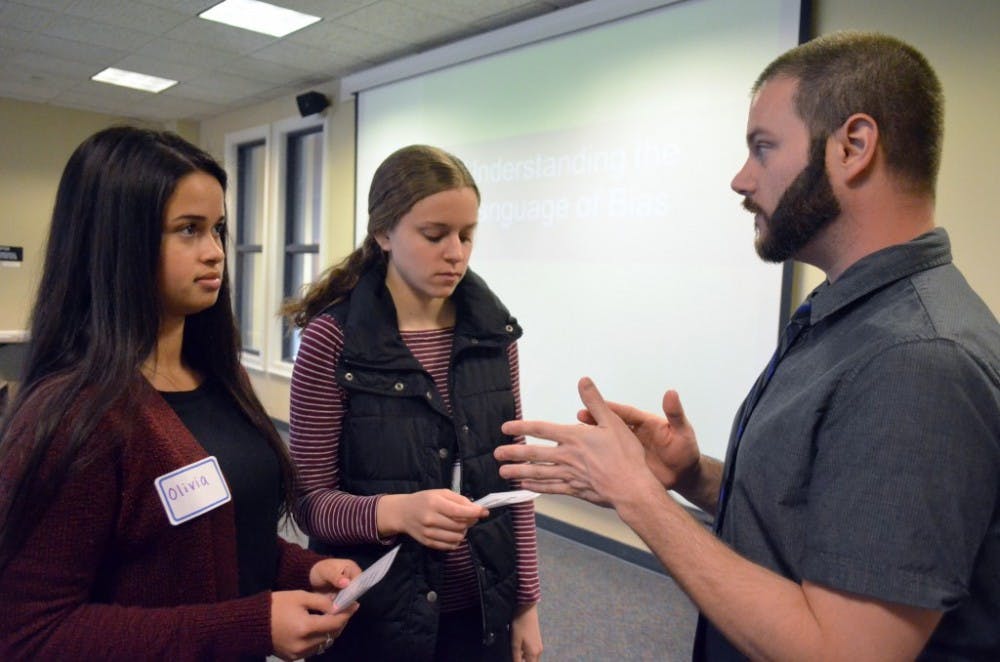This Winter Term, Elon University rolled out a new diversity training session with good intentions, but was met with mixed reviews and more than a little confusion.
At first, the university said freshmen had to attend at least one mandatory session. The thought brought out some grumbles from students — each workshop is four hours long. Although some informative emails said attending the session was required, others implied a strongly-encouraged type of attendance.
Currently, the Elon website states that all freshmen are “expected” to attend.
The national program, called “A Campus of Difference,” was brought to Elon by the Anti-Defamation League (ADL), in order to increase understanding of racial and cultural issues.
Though the university has made strides toward increasing campus diversity each year, the statistics are still stark: 82 percent white, 6 percent black, 5 percent Hispanic and 2 percent Asian.
Compared to other private universities in North Carolina like Wake Forest University and Davidson College, Elon has a slightly less diverse student population.
Steven House, provost and vice president for academic affairs, said holding these seminars is a part of Elon’s “new strategic plan” and demonstrates the university’s commitment to improving diversity on campus.
“We really want to expose the students to diversity,” House said. “We wanted a lot of first-year students to do it [because] we think it’s important.”
House clarified that the sessions are currently not mandatory and faculty and staff members are still deciding whether it will become a requirement in the future.
Freshman Jessie Boak said that she felt the campus was aware of the lack of diversity and was working to develop the cultural atmosphere.
“I don’t think Elon is very diverse, but I think they’re trying very hard to change that and inform us more about diversity,” Boak said.
Freshman Brooke Wivagg, who was under the impression the training was required, recently attended one of the sessions led by Elon staff, Esther Freeman, director for Watson and Odyssey Scholars program, and Randy Williams, dean of multicultural affairs. Wivagg said the training focused on eliminating stereotypes and developing a heightened sense of self-efficacy.
“We defined words relating to prejudice and discrimination and how they are used,” Wivagg said.
The interactive sessions require students to discuss issues and hot topics surrounding college campuses. Wivagg described one activity where students chose several words that defined themselves, and then selected the term that they identified with most.
Other activities in the sessions were largely focused on defining words that related to stereotypes and prejudices and how they impact society. Because of the discussion-based format, one of Wivagg’s favorite parts of the training was that she met a lot of new people.
“While I personally didn’t learn anything that I didn’t already know, I think it is great that Elon is trying to be more diverse,” Wivagg said.
After Winter Term, the training sessions will be evaluated based on effectiveness and necessary adjustments will be made. In the spring, students who are part of a residence hall or club can make requests for training seminars.
“[The seminars] will be offered whenever students want to do them,” House said. “We have lots of faculty and staff who have been trained to do it.”
Currently, 41 faculty and staff members are qualified to administer the training sessions, including MarQuita Barker, associate director of residence life. She believes the training assists students to be more aware of themselves and others.
“Hopefully students will figure out who they are, so they can appreciate others,” Barker said.
Barker said that Leigh-Anne Royster, director of inclusive community well-being, has been working for three years to bring the ADL training sessions to Elon’s campus. Royster has been the primary facilitator of this initiative on campus and continues to be the leading coordinator of the training.
Founded in 1913 to combat anti-Semitism, the ADL is a national leader in advocating civil rights and preserving democratic ideals. “A Campus of Difference” training sessions have been held on more than 900 college campuses and each university has the option to customize the sessions according to the university’s individual needs.
Instead of training sessions, some students propose that establishing a more diverse student body would naturally facilitate a greater sense of diversity and awareness. Rather than just talking about diversity, first-year student Haley Hostetter said implementing diversity would produce the most effective results.
“I feel like having actual diversity would be better than actually learning about it,” Hostetter said.
Although the current training sessions provided by Elon could be revamped to include better information, Wivagg said she still benefitted from attending.
“I would recommend it to other students because it’s nice to have a refresher on things we can do to make the Elon community more diverse,” Wivagg said. “Not going to lie, I thought that four hours was a little too long, but nonetheless, I walked out of the room feeling proud to go to a school that was making such great strides in educating their students on diversity.”


